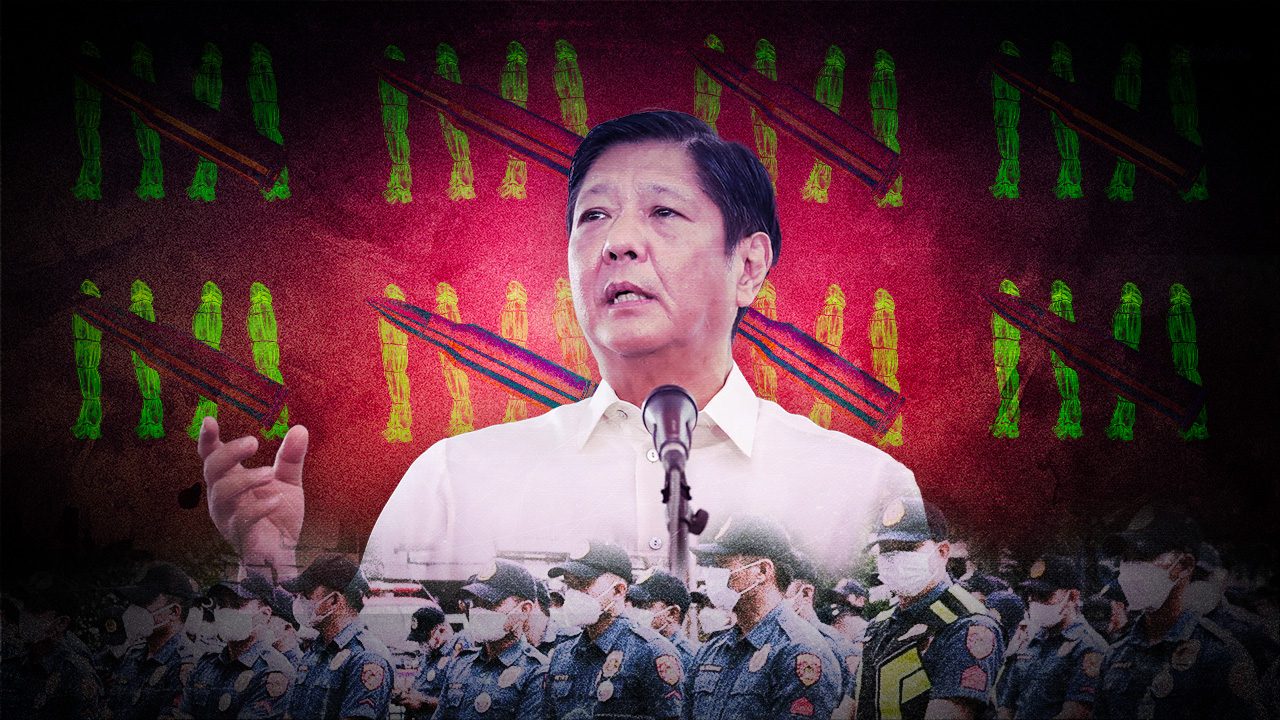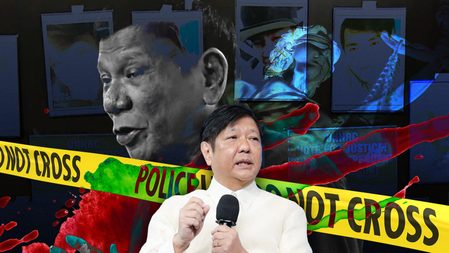SUMMARY
This is AI generated summarization, which may have errors. For context, always refer to the full article.

MANILA, Philippines – Violence continues well into the new administration as President Ferdinand Marcos Jr. closes his first year in office with more than 300 deaths allegedly related to the continuing war on drugs.
At least 342 drug-related killings were recorded from July 1, 2022 to June 30, 2023, according to the Dahas Project of the University of the Philippines’ Third World Studies Center.
Out of this total, 115 were killed during anti-illegal drug operations conducted by the government, including the Philippine National Police (PNP). This number increases to 146 to include those killed by state agents outside of anti-illegal drug operations, but were later found to have links to illegal drugs.
The Dahas project monitors drug-related killings reported in the media across the Philippines. These sources, including news reports from regional newspapers, are publicly posted on the project’s website.
The number monitored by Dahas is significantly higher than what the PNP provided to Rappler.
In response to a separate freedom of information request lodged on Wednesday, July 5, the National Operations Support Unit (NOSU) of the PNP Drug Enforcement Group (DEG) said that “FIVE (5) is the total number of people killed in illegal drugs” from July 2022 to June 2023.
DEG is the unit that leads the anti-illegal drug efforts of the national police.
The number provided by the PNP to Rappler is significantly different from what its own chief said in November 2022. In a forum by the Foreign Correspondents Association of the Philippines, then-PNP chief Rodolfo Azurin Jr. said that 46 people were already killed in anti-illegal drug operations by the state – 32 by police and 14 by PDEA agents.
Rappler reached out to get the PNP’s side through its Public Information Office through email and a text message to spokesperson Police Colonel Jean Fajardo on Thursday, July 6, but has yet to receive a reply. We will update this story once we get a statement.
Marcos administration ‘being even more opaque’
During the Duterte years, the PNP and the Philippine Drug Enforcement Agency released numbers online through the #RealNumbersPH platform on Facebook. While these numbers are heavily contested, it provided the public a view of the violence that the government perpetrated since coming into power in 2016.
The Dahas project is the only one, if not one of the remaining efforts, to monitor the number of killings related to the war on drugs that continues well into the Marcos administration.
A May 2023 report by the United Nations Office of the High Commissioner for Human Rights cited the Dahas project as an example of “bringing casualty recording to bear on further compliance with international human rights and humanitarian law.”
Sol Iglesias, assistant professor of political science at the University of the Philippines Diliman, said that Dahas data is credible as they “follow a published method of data collection, in keeping with international standards in violence incident monitoring both in the academe and by other research institutions.”
The same cannot be said about the data that the PNP provided to Rappler. The fact that the institution does not release any further information on the total number of killed in the past year – including the circumstances of the deaths – “just raises more questions than it answers.”
“The government may be continuing the lack of transparency of the previous administration, or perhaps it is being even more opaque,” Iglesias told Rappler.
“Under a climate of transparency, media or academic reports and official government sources should tally much more closely,” she added.
False image of the drug war
Calls for transparency come as Marcos marks his first year in office without explicit efforts to stop the violent drug war beyond rhetoric.
In the past, the President said he would be taking on a different approach since enforcement “only gets you so far” and that a “focus on enforcement” resulted in “abuses by certain elements in the government” during the Duterte years.
Philippine Human Rights Information Center (PhilRights) executive director Nymia Pimentel-Simbulan said the lack of transparency coupled with continued violence on the ground shows that Marcos may not be deviating from Duterte, or at least in terms of policies.
“The discrepancy in reported figures also indicates that the Marcos government is no different from its predecessor in disseminating lies and misinformation in order to project a false image of the drug war,” she told Rappler.
PhilRights is a human rights organization that documented cases of killings under Duterte’s drug war while providing necessary assistance to families left behind. It has continued doing so under the new administration, with Simbulan noting that there have been many unreported killings.
“That law enforcement agencies continue with this abhorrent practice only highlights the insincerity of the Marcos administration’s claims that its anti-illegal drug efforts are above board and respectful of rule of law and of human rights,” she said. – Rappler.com
Add a comment
How does this make you feel?



![[The Slingshot] Lito Patay’s 4 hours and 38 minutes of infamy](https://www.rappler.com/tachyon/2024/07/Lito-Patay-4-hours-infamy-July-19-2024.jpg?resize=257%2C257&crop=233px%2C0px%2C720px%2C720px)

![[The Slingshot] A Duterte and Bato cop named Patay](https://www.rappler.com/tachyon/2024/06/tl-lito-patay.jpg?resize=257%2C257&crop=322px%2C0px%2C720px%2C720px)



![[Just Saying] SONA 2024: Some disturbing points](https://www.rappler.com/tachyon/2024/07/TL-marcos-sona-points-july-23-2024.jpg?resize=257%2C257&crop=335px%2C0px%2C720px%2C720px)






There are no comments yet. Add your comment to start the conversation.